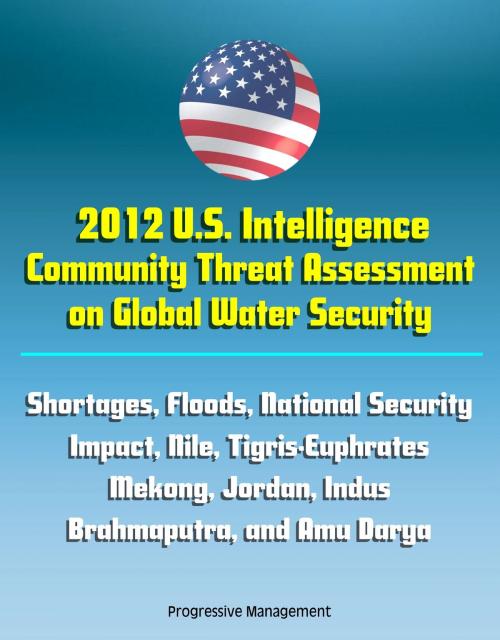2012 U.S. Intelligence Community Threat Assessment on Global Water Security: Shortages, Floods, National Security Impact, Nile, Tigris-Euphrates, Mekong, Jordan, Indus, Brahmaputra, and Amu Darya
Nonfiction, Science & Nature, Science, Earth Sciences, Social & Cultural Studies, Political Science| Author: | Progressive Management | ISBN: | 9781476419312 |
| Publisher: | Progressive Management | Publication: | March 24, 2012 |
| Imprint: | Smashwords Edition | Language: | English |
| Author: | Progressive Management |
| ISBN: | 9781476419312 |
| Publisher: | Progressive Management |
| Publication: | March 24, 2012 |
| Imprint: | Smashwords Edition |
| Language: | English |
This report, issued in February 2012 and requested by the Department of State, is designed to answer the question: How will water problems (shortages, poor water quality, or floods) impact US national security interests over the next 30 years? We selected 2040 as the endpoint of our research to consider longer-term impacts from growing populations, climate change, and continued economic development. However, we sometimes cite specific time frames (e.g., 2030, 2025) when reporting is based on these dates. For the Key Judgments, we emphasize impacts that will occur within the next 10 years.
We provide an introductory discussion of the global water picture, but we do not do a comprehensive analysis of the entire global water landscape. For the core classified analysis—a National Intelligence Estimate—we focused on a finite number of states that are strategically important to the United States and transboundary issues from a selected set of water basins (Nile, Tigris-Euphrates, Mekong, Jordan, Indus, Brahmaputra, and Amu Darya). We judge that these examples are sufficient to illustrate the intersections between water challenges and US national security.
During the next 10 years, many countries important to the United States will experience water problems—shortages, poor water quality, or floods—that will risk instability and state failure, increase regional tensions, and distract them from working with the United States on important US policy objectives. Between now and 2040, fresh water availability will not keep up with demand absent more effective management of water resources. Water problems will hinder the ability of key countries to produce food and generate energy, posing a risk to global food markets and hobbling economic growth. As a result of demographic and economic development pressures, North Africa, the Middle East, and South Asia will face major challenges coping with water problems.
We assess that during the next 10 years, water problems will contribute to instability in states important to US national security interests. Water shortages, poor water quality, and floods by themselves are unlikely to result in state failure. However, water problems— when combined with poverty, social tensions, environmental degradation, ineffectual leadership, and weak political institutions— contribute to social disruptions that can result in state failure. We have moderate confidence in our judgment as we have reliable open source reporting on water pricing and infrastructure investments and reliable but incomplete all-source reporting on water quality.
The lack of adequate water will be a destabilizing factor in some countries because they do not have the financial resources or technical ability to solve their internal water problems. In addition, some states are further stressed by a heavy dependency on river water controlled by upstream nations with unresolved water-sharing issues. Wealthier developing countries probably will experience increasing water-related social disruptions but are capable of addressing water problems without risk of state failure.
We assess that a water-related state-on-state conflict is unlikely during the next 10 years. Historically, water tensions have led to more water-sharing agreements than violent conflicts. However, we judge that as water shortages become more acute beyond the next 10 years, water in shared basins will increasingly be used as leverage; the use of water as a weapon or to further terrorist objectives also will become more likely beyond 10 years. We have high confidence in our judgments because there are excellent all-source reports on future water shortages and a well-established pattern of water problems aggravating regional tensions.
This report, issued in February 2012 and requested by the Department of State, is designed to answer the question: How will water problems (shortages, poor water quality, or floods) impact US national security interests over the next 30 years? We selected 2040 as the endpoint of our research to consider longer-term impacts from growing populations, climate change, and continued economic development. However, we sometimes cite specific time frames (e.g., 2030, 2025) when reporting is based on these dates. For the Key Judgments, we emphasize impacts that will occur within the next 10 years.
We provide an introductory discussion of the global water picture, but we do not do a comprehensive analysis of the entire global water landscape. For the core classified analysis—a National Intelligence Estimate—we focused on a finite number of states that are strategically important to the United States and transboundary issues from a selected set of water basins (Nile, Tigris-Euphrates, Mekong, Jordan, Indus, Brahmaputra, and Amu Darya). We judge that these examples are sufficient to illustrate the intersections between water challenges and US national security.
During the next 10 years, many countries important to the United States will experience water problems—shortages, poor water quality, or floods—that will risk instability and state failure, increase regional tensions, and distract them from working with the United States on important US policy objectives. Between now and 2040, fresh water availability will not keep up with demand absent more effective management of water resources. Water problems will hinder the ability of key countries to produce food and generate energy, posing a risk to global food markets and hobbling economic growth. As a result of demographic and economic development pressures, North Africa, the Middle East, and South Asia will face major challenges coping with water problems.
We assess that during the next 10 years, water problems will contribute to instability in states important to US national security interests. Water shortages, poor water quality, and floods by themselves are unlikely to result in state failure. However, water problems— when combined with poverty, social tensions, environmental degradation, ineffectual leadership, and weak political institutions— contribute to social disruptions that can result in state failure. We have moderate confidence in our judgment as we have reliable open source reporting on water pricing and infrastructure investments and reliable but incomplete all-source reporting on water quality.
The lack of adequate water will be a destabilizing factor in some countries because they do not have the financial resources or technical ability to solve their internal water problems. In addition, some states are further stressed by a heavy dependency on river water controlled by upstream nations with unresolved water-sharing issues. Wealthier developing countries probably will experience increasing water-related social disruptions but are capable of addressing water problems without risk of state failure.
We assess that a water-related state-on-state conflict is unlikely during the next 10 years. Historically, water tensions have led to more water-sharing agreements than violent conflicts. However, we judge that as water shortages become more acute beyond the next 10 years, water in shared basins will increasingly be used as leverage; the use of water as a weapon or to further terrorist objectives also will become more likely beyond 10 years. We have high confidence in our judgments because there are excellent all-source reports on future water shortages and a well-established pattern of water problems aggravating regional tensions.















